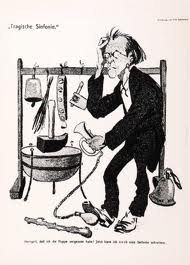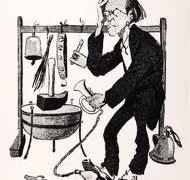Do we need silence more than we need music?
mainFrom a new essay by Chicago psychoanalyst Gerald Stein.
… (Simon) Rattle’s mentor Berthold Goldschmidt said to him, “Will you please remember what the phrase “ohne hast” (without haste) means in a time when there were no automobiles.” Nor the sounds from such motor cars, he might have added.
Amplified sound became like floor-to-ceiling audio wallpaper over the course of the twentieth century. Civilization capitulated to its growth.
At first, Western society sought realistic prerecorded melodies. Who among us realized we would pay for this miracle, not just in money spent on phonographs, discs, and streaming services?
Convenience and ubiquity leached away some of the thrills of performances created in our presence. The novel sense of a special occasion diminished. The sonorities we loved became routine.
For music to produce its intended effect, the airborne notes must grow out of silence….
Read on here.







I like the description of ‘overused ears’. Also in music life, it seems that the ability of making distinctions within the range of sounds that reach those ears, has eroded in inverted proportion to its mass. There is not enough silence, true; there is a need of stillness and reflection, especially concerning classical music and its meaning in the context of the modern world. But even performing John Cage’s 4’33” ad infinitum would not offer any solution.
https://www.futuresymphony.org/deep-listening/
Pardon ?
Noise pollution is the bane of my existence. It’s almost impossible to get away from it entirely. He even mentions the chainsaws that ruin nature. Just how badly noise permeates the world can be heard on older recordings. With headphones on it’s funny how often you hear traffic noise and other disturbances in the background. Probably wouldn’t have been audible on LP, but CDs make it very clear.
Au contraire: you can hear anti-aircraft guns in Gieseking’s wartime Emperor Concerto recording with Arthur Rother, which I have on LP.
Audiophiles speak of music in their office spaces. They spend large amounts of money on DACs, headphones, headphone amps, monitor speakers, etc…
They see no contradiction in “listening” to music while working.
When I started work in 1977, my “office” space had been created by putting up flimsy walls and a suspended ceiling in an area that had previously been a large open area, perhaps a filing area. There was a speaker in the ceiling directly over my desk and Muzak — the actual Muzak brand of continuous insipid music — played all day long. I complained that I simply could not tolerate listening to this awful stuff all day and still get my work done (and Muzak was/is very scientifically calculated for office environments, so it was jaunty and “motivating” early in the work day, progressively more peaceful nearing lunch, and then jaunty again about the time when some of my older colleagues might have been tempted to close the office door and take a brief snooze.) There was even the same Muzak in the library, but again when I would remark on this to my new work colleagues they reacted with surprise and confusion – what music?
I seem to recall reading that composer Roy Harris had done some research about tempos of music and their subconscious effect on listeners. Whether this research impacted Muzak or not I do not know. Listening to the most mundane of Roy Harris’s music would likely have been a relief after hearing the Muzak playlist day after day after day.
Not only was I told I was the only person to complain about the Muzak, but that I seemed to be the only person who was even aware it was there. It was not intended to be “listened to” only to have this effect, using tempo and rhythm to placate and moderate mood and attitude. But as a musician I couldn’t not hear it.
I was also told that there was nothing that could be done – they had no control over individual speakers in the ceilings. One Saturday I came into work with some tools I borrowed from my folks’ house, climbed on my desk, unscrewed the cover to the speaker, severed one wire to the speaker, and the problem was resolved. Blessed silence. Of course that also meant I did not hear all the little announcements that from time to time were made over the company-wide sound system but that was no loss.
So when they renovated the offices and built a new office tower to boot, Muzak was eliminated. But interestingly, instead they played continuously and at all times a very low volume of “white noise” – – sort of the hash sound you’d hear when tuning in a radio and the tuner was between stations. The effect of the white noise was to cover up the lowest level of little incidental sound – the sound of footsteps on the floor, paper being shuffled, perhaps the sound of a pen scratching on paper, desk drawers being opened and closed. The intended effect was to make the workplace seem incredibly quiet and peaceful. But once again I could hear that “hash” noise all day long (like a very quiet but perpetual frying egg). Eventually I got a “real” office that had no speaker within the confines of the room. Blessed relief. But when I remarked on that continuous white noise hash, nobody at all seemed even vaguely aware of it, only that the workplace seemed very quiet.
But the experience did make plain to me that the vast population of people who say they “like music” but do not themselves make music, can exist in an environment of deliberately created noise and bland music and be utterly oblivious to it.
As for me I can listen to music or I can work but I cannot do both at the same time. And I cannot unhear that which I do not wish to hear. How interesting or beautiful the music is has no bearing on how distracting I find it.
Videntes non vident et audientes non audiunt neque intellegunt
“For music to produce its intended effect, the airborne notes must grow out of silence”. This is a truth very few musicians seem to understand, particularly in the back of symphony orchestras.
Another perspective, from a different time: Carl Nielsen, in his book “Living Music” (1900) –
“The rests, then, are just as important as the notes. Often they are far more expressive and appealing to the imagination. For this reason one could wish that many modern composers would confine themselves to rests – but perhaps that is too much to ask”.
It’s slippery slope thinking, eventually ending in Cage’s 4’33”.
Rests, and whatever kind of silence in the context of music, only acquires meaning if part of a sounding musical work, like a pause only has its effect within a speech. Take away the sound and the silence looses its meaning as well.
Thanks for this comment, Ricardo.
Dizzy Gillespie once said something like (I’m paraphrasing, due to my unreliable memory): “The notes are great, but it’s what’s between the notes that makes music.”
He must have got it from Debussy who said something similar. Pellés et Mélisande is full of meaningful pauses, and on the crucial moment of the opera when they say ‘I love you’ – ‘I love you too’ – the orchestra is suddenly silent, which sends the shivers through the audience.
Didn’t Arvo just answer that question?
Although I do not disagree with the overall point of this , I think there is a kind of illusion that all was quiet before the industrial and then the motorised transport revolution . But it wasn’t : the sound of a horse clip-clopping past my surburban house is amazingly intrusive even today , and the thought of iron-clad carriage wheels on cobbles in towns ! But , on a quiet morning , usually a Sunday, at say 5 a.m. I can sometimes hear the cows mooing at a farm nearly a mile away….so there is still silence to be experienced , sometimes
While working in Zurich, Wagner was greatly hindered by a forge further down the street. The sound still got into the Ring, providing the ‘anvil music’ in Rheingold.
And John Cage, searching for his own, authentic voice in music, began listening to his inner world and came up with 4’33”.
I hear that Johnson & Johnson is developing ear plugs for people who are being dragged to classical music concerts against their better judgment, under the name of Cage Plugs. Pharmacies in Germany have been selling Beethoven Ohrstöpsel already for years, specifically destined for protection against Klangkunst.